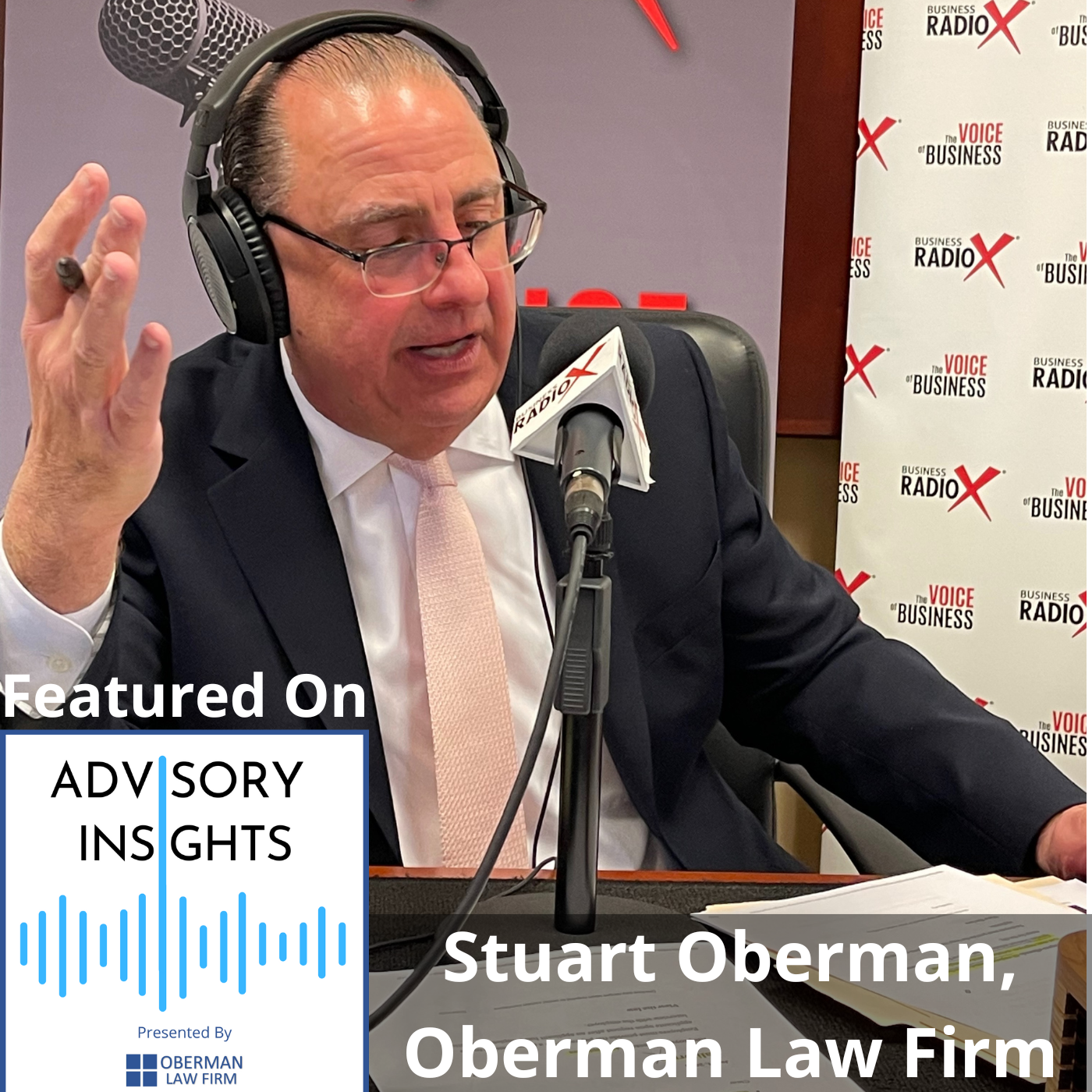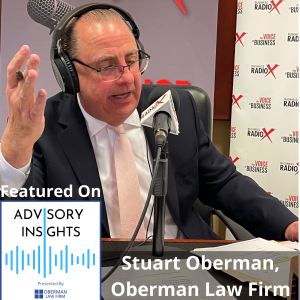
Considerations When Expanding Globally (Advisory Insights Podcast, Episode 22)
On this episode of Advisory Insights, Stuart Oberman of Oberman Law Firm discussed some of the challenges businesses face when expanding globally, including compliance with various laws and regulations. He stressed the importance of getting expert legal counsel to advise on these matters.
Advisory Insights is presented by Oberman Law Firm and produced by the North Fulton studio of Business RadioX®. The series can be found on all the major podcast apps. You can find the complete show archive here.
TRANSCRIPT
Intro: [00:00:01] Broadcasting from the studios of Business RadioX, it’s time for Advisory Insights. Brought to you by Oberman Law Firm, serving clients nationwide with tailored service and exceptional results. Now here’s your host.
Stuart Oberman: [00:00:20] Welcome everyone to Advisory Insights. Stuart Oberman here as your host. I want to talk a little bit about going global. So, as a law firm, we are very, very fortunate. We have clients that are growing globally. We have clients that are coming across border into the United States. And it’s got its own twists and turns. So, I want to drill down a little bit on considerations when expanding globally.
Stuart Oberman: [00:00:53] So, look, as we enter 2023, as we go into it, companies are anticipating and increasing international business activity. That’s just the way it is, whether it’s products, whether it’s services. Everything now, it seems, is going cross-border, whether it’s across the pond to Europe or to our friends up north to Canada. So, a lot of our clients think that going globally is necessary in order to maintain long term growth.
Stuart Oberman: [00:01:25] And a lot of those markets are Western Europe and China. But I will tell you, the emerging markets are Mexico, Brazil, and India. So, I think that you’ve got to take a look at some of those opportunities. Now, I will tell you, once you get into those countries and once those countries come into us, on the expansion side, you’ve got mandated compliance that is very different.
Stuart Oberman: [00:01:58] But I want to talk about our clients going globally. So, you’ve got absolute mandated regulatory compliance that is required. For every different country, you’re going to have a different regulation. You look at Canada, you’ve got providences. A lot of providences are absolutely separate. They’ve got their own rules, regulations, they’ve got their own regulatory boards. So, you’ve got to know this.
Stuart Oberman: [00:02:23] So, I want to take a look at a couple of considerations going global expansion, corporate governance. One is that, in a lot of jurisdictions, you have to have a physical presence. You have to have a registered agent. You have to have, in some cases, actual subsidiaries. And in some jurisdictions, you have to look at the regulatory compliance and tax considerations.
Stuart Oberman: [00:02:52] So, if you have an expansion that requires in a foreign jurisdiction forming a subsidiary, you’ve got to look in multiple corporate structures for that. Are they going to have shareholders? Are they going to have members? Are they going to comply with certain regulatory matters as far as registration goes? How’s the names?
Stuart Oberman: [00:03:19] Another area you have to look at is regulatory compliance. Folks, you know, some jurisdictions absolutely require import and export licenses. Do you know what that is? And that includes technology and products. So, are you exporting your technology into another country? What’s the compliance? Are you importing into another country products? What is the taxes? What are the tax stamps? So, depending on your service, your product, your facility, you’re going to have regulatory compliance issues and they are very, very complex.
Stuart Oberman: [00:04:03] Now, of course, we all know there’s tax considerations. So, some laws, depending on jurisdiction, are very, very strict, some are very high, some are very favorable tax structures. You have to know what your tax structure is, what your tax liability is before you start getting into the export of services and products. You have to retain counsel. You have to retain a CPA, if you will, that is well-versed on those particular regulations. What are the direct taxation rules? What are the antideferral rules? If you don’t know what antideferral rules are, you have to take a step back and understand that.
Stuart Oberman: [00:04:56] Now, I want to take a look at employment, area number four. In a foreign country, there are some cases where you have to enter into and adhere to strict collective bargaining requirements. Some require work permits for non-local nationals. What are your requirements if you have members of the company that are from the states, if you will, going into China, into Western Europe, into Mexico, Brazil, India? What are the local national requirements? You have to understand what the benefits are if you are hiring personnel from that particular country. What are the mandated benefits? Folks, there’s mandated benefits that are different in Canada, in Europe, Asia, South America.
Stuart Oberman: [00:05:49] Now, one of the biggest concerns that you should always have in any kind of expansion globally is trade secrets, privacy and non-compete agreements. What are you going to do if, all of a sudden, your models, your technology, your outsourcing is being stripped of its privacy? And all of a sudden you’ve got duplicates flooding the market. What are you going to do? How are you going to deal with it? Are you going to lose money? Just think of the counterfeit luxury brands that come into the states. Well, what’s going to happen if you’re over there and your brand, your product is hijacked? And then, you’ve got duplicates. You’ve got counterfeit. What do you do?
Stuart Oberman: [00:06:45] I also want to look at a couple things regarding global equity. So, certain security laws in certain countries may have very strict corporate equity distribution models. Some are unique. Some involve fund remittance limits. Some involve reporting. Some involve repatriate of funds and requirements. Do you know what those requirements are? Do you know the structure for the corporate equity distributions? You have to understand the accounting mechanisms for that as far as the tax benefits and the replacement or awarding of equity to the employees.
Stuart Oberman: [00:07:25] Again, I want to drill down a little bit on data privacy, intellectual property technology, and information law. So, again, each country is going to have different privacy, data transfer, customer employee notification laws, data monitoring, payment obligations. What happens if they are found to be liable for your stripping of ideas, they’re counterfeiting?
Stuart Oberman: [00:07:52] So, not only do you have state and federal law, if you will, going into different global jurisdictions, but you’ve got local laws regarding the enforcement and validation of intellectual property assignments. How are you going to transfer various company policies, procedures, and assignments to different entities that you create in a different country? Do you have those particular trade secrets protections in order? Are you training your staff, your team members, your office, or your directors who are located in that country and are national to that particular jurisdiction and country? Have you trained them? Are you training them?
Stuart Oberman: [00:08:40] And then, from an accounting standpoint, what are the tax or replacement benefits for, again, awarding equity to employees? Is that confidential? What about relevant technology regarding newly formed subsidiaries? How are you training your people? What are the restrictions on third party technology due to territorial restrictions? Do you know what those are?
Stuart Oberman: [00:09:09] Folks, these are just a mirror of some things you can run into. You’ve got corporate governance, regulatory compliance, tax considerations, employment matters, global equity distributions, data privacy, intellectual property, technology, information law. Those are the things you have to have a really, really expert grasp on before you’re ready to expand.
Stuart Oberman: [00:09:35] Folks, again, I can’t stress enough if you’re going to expand globally, you have to understand those ramifications and you’ve got to get appropriate legal counsel to outline those things.
Stuart Oberman: [00:09:47] Folks, thanks again for joining us on Advisory Insights. Stuart Oberman here. If you have any questions, give us a call, 770-886-2400, or send me an email, stuart@obermanlaw.com. Thanks a lot. Have a fantastic day.
Outro: [00:10:07] Thank you for joining us on Advisory Insights. This show is brought to you by Oberman Law Firm, a business-centric law firm representing local, regional, and national clients in a wide range of practice areas, including health care, mergers and acquisitions, corporate transactions, and regulatory compliance.
About Advisory Insights Podcast
Presented by Oberman Law Firm, Advisory Insights Podcast covers legal, business, HR, and other topics of vital concern to healthcare practices and other business owners. This show series can be found here as well as on all the major podcast apps.
Stuart Oberman, Oberman Law Firm

Stuart Oberman is the founder and President of Oberman Law Firm. Mr. Oberman graduated from Urbana University and received his law degree from John Marshall Law School. Mr. Oberman has been practicing law for over 25 years, and before going into private practice, Mr. Oberman was in-house counsel for a Fortune 500 Company. Mr. Oberman is widely regarded as the go-to attorney in the area of Dental Law, which includes DSO formation, corporate business structures, mergers and acquisitions, regulatory compliance, advertising regulations, HIPAA, Compliance, and employment law regulations that affect dental practices.
In addition, Mr. Oberman’s expertise in the healthcare industry includes advising clients in the complex regulatory landscape as it relates to telehealth and telemedicine, including compliance of corporate structures, third-party reimbursement, contract negotiations, technology, health care fraud, and abuse law (Anti-Kickback Statute and the State Law), professional liability risk management, federal and state regulations.
As the long-term care industry evolves, Mr. Oberman has the knowledge and experience to guide clients in the long-term care sector with respect to corporate and regulatory matters, assisted living facilities, continuing care retirement communities (CCRCs). In addition, Mr. Oberman’s practice also focuses on health care facility acquisitions and other changes of ownership, as well as related licensure and Medicare/Medicaid certification matters, CCRC registrations, long-term care/skilled nursing facility management, operating agreements, assisted living licensure matters, and health care joint ventures.
In addition to his expertise in the health care industry, Mr. Oberman has a nationwide practice that focuses on all facets of contractual disputes, including corporate governance, fiduciary duty, trade secrets, unfair competition, covenants not to compete, trademark and copyright infringement, fraud, and deceptive trade practices, and other business-related matters. Mr. Oberman also represents clients throughout the United States in a wide range of practice areas, including mergers & acquisitions, partnership agreements, commercial real estate, entity formation, employment law, commercial leasing, intellectual property, and HIPAA/OSHA compliance.
Mr. Oberman is a national lecturer and has published articles in the U.S. and Canada.
Oberman Law Firm
Oberman Law Firm has a long history of civic service, noted national, regional, and local clients, and stands among the Southeast’s eminent and fast-growing full-service law firms. Oberman Law Firm’s areas of practice include Business Planning, Commercial & Technology Transactions, Corporate, Employment & Labor, Estate Planning, Health Care, Intellectual Property, Litigation, Privacy & Data Security, and Real Estate.
By meeting their client’s goals and becoming a trusted partner and advocate for our clients, their attorneys are recognized as legal go-getters who provide value-added service. Their attorneys understand that in a rapidly changing legal market, clients have new expectations, constantly evolving choices, and operate in an environment of heightened reputational and commercial risk.
Oberman Law Firm’s strength is its ability to solve complex legal problems by collaborating across borders and practice areas.
Connect with Oberman Law Firm:
Company website | LinkedIn | Twitter
















